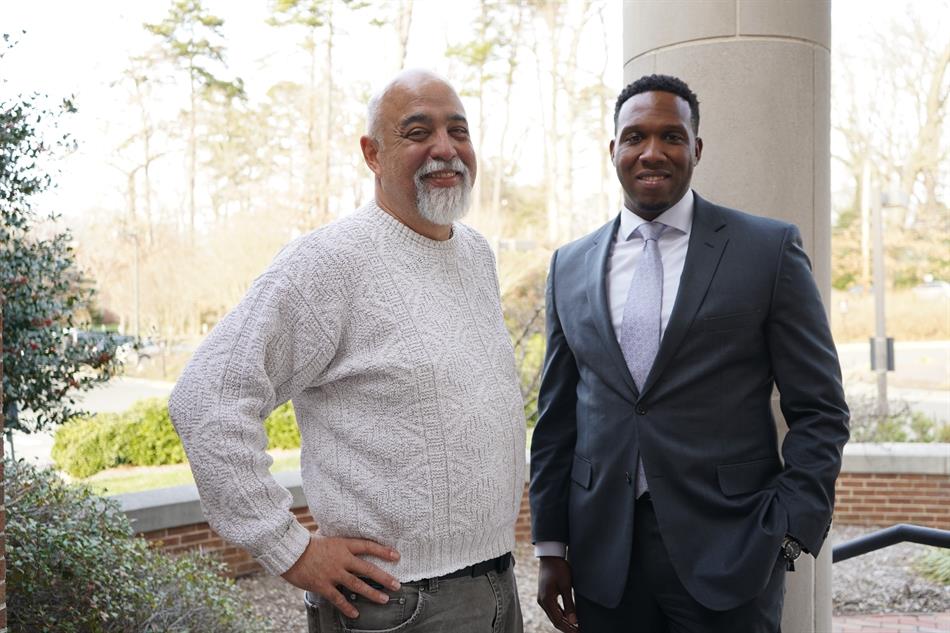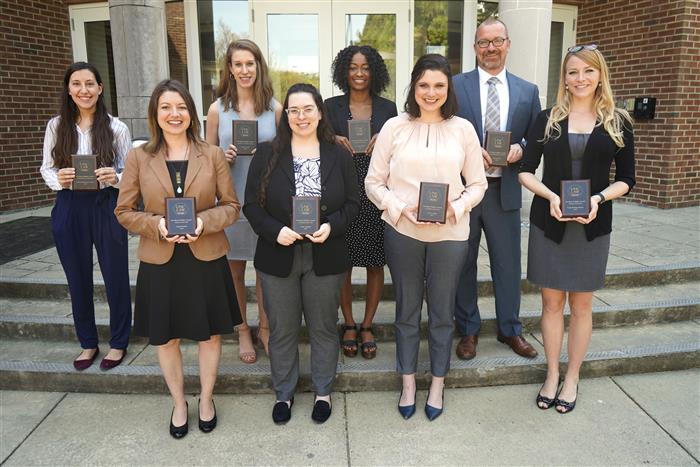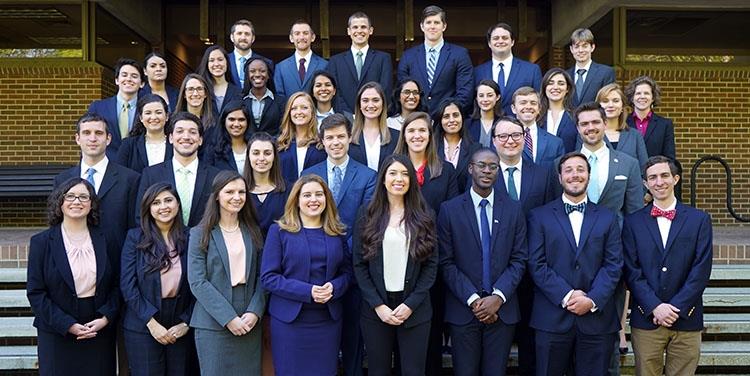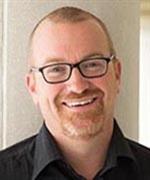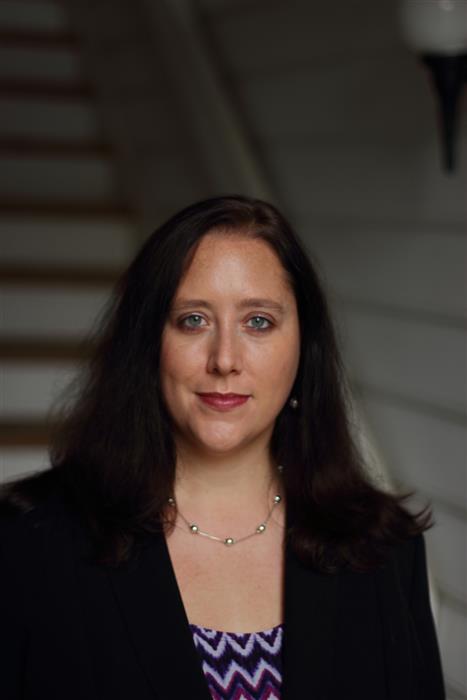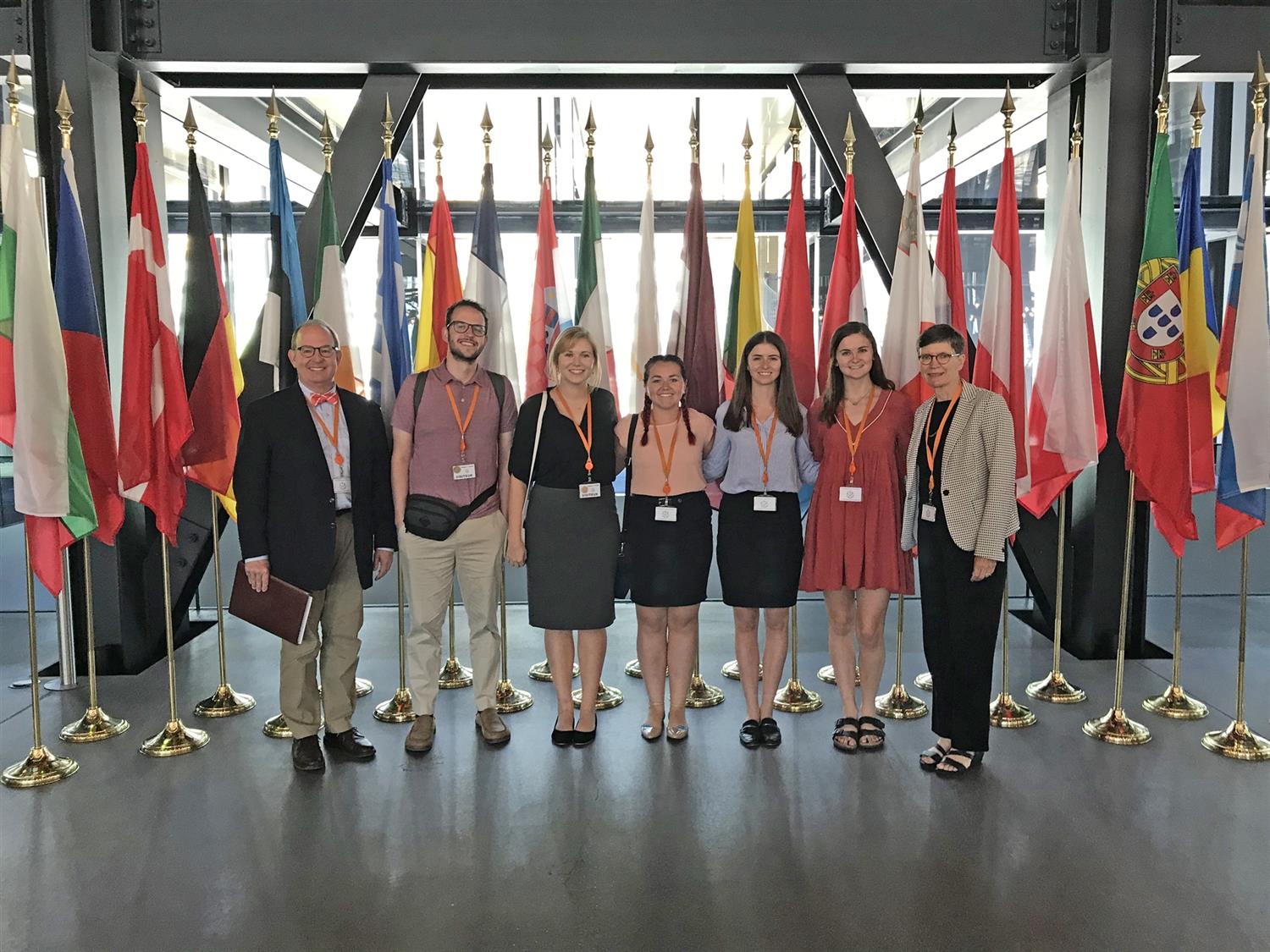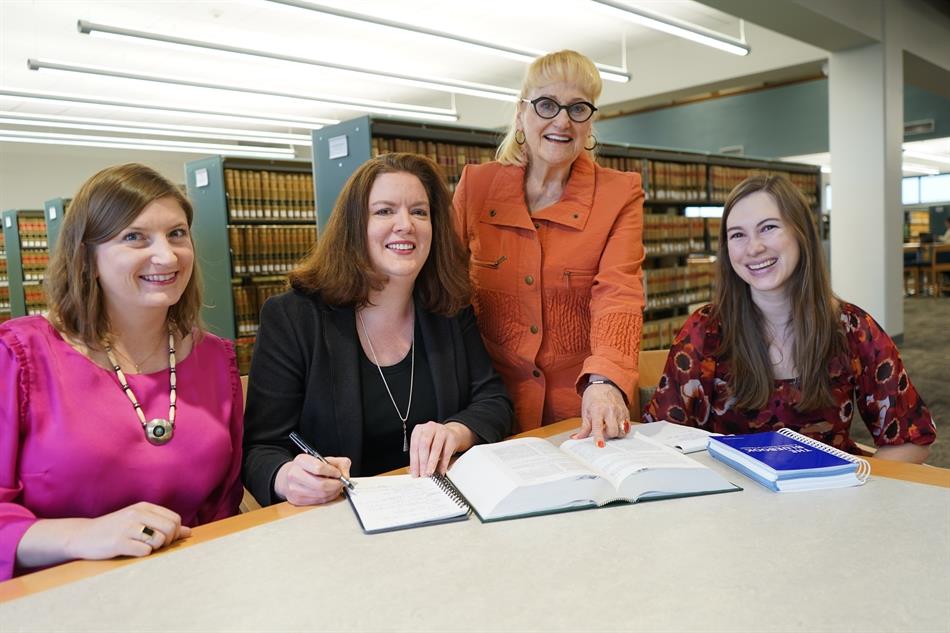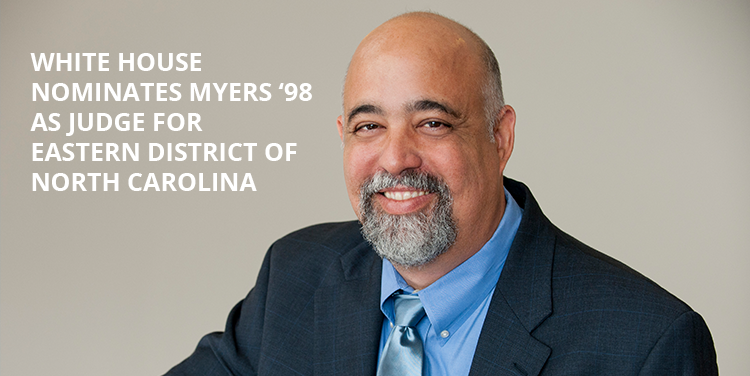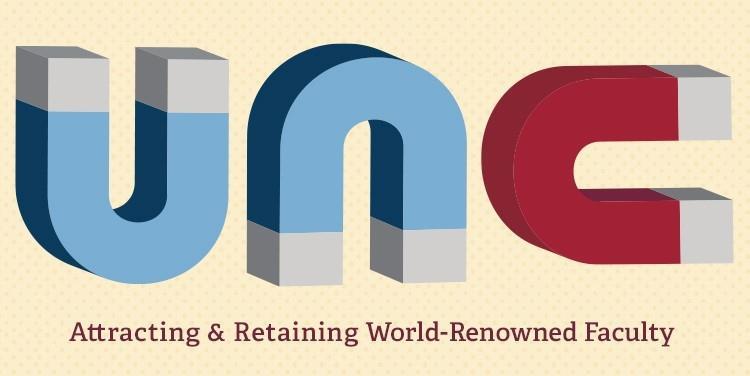This article originally appeared in the Spring/Summer 2019 issue of Carolina Law magazine.
Collaborations with students and alumni show how truly committed Carolina Law's faculty is to scholarship, research, service and educating the next generation of the legal profession.
In researching a book about mass incarceration, Joe Kennedy, the Martha Brandis Professor of Law, tapped Kasi Wahlers '17, then a second-year law student at Carolina Law, to do a literature review for the drug chapter. A data set from the National Incident-Based Reporting System harbored some stats about arrests by local law enforcement agencies, but neither Kennedy nor Wahlers had worked with big data before.
![Kasi Wahlers]()
Professor Joe Kennedy and Kasi Wahlers '17 worked together on a research article about the overrepresentation of people of color in felony arrests for
small amounts of drugs.
Wahlers took the CD-ROM to the Odum Institute at Davis Library for help downloading and converting the data to a usable form. Then she contacted Isaac Unah, a political science professor whose class she had taken as an undergraduate at UNC-Chapel Hill and who routinely works with quantitative data. She put him in touch with Kennedy, and the three began playing with the data and asking questions.
They discovered information about the race of those arrested for drug offenses and the quantity of drugs involved that no one else had written about. All three are listed as co-authors on the resulting research article that re-thinks felony liability for low-level drug offenders and documents the overrepresentation of people of color in felony arrests for small amounts of drugs.
Writing the research article, published in UC Davis Law Review in January, “was a chance to do something that would have more impact than just a grade,” Wahlers said. Many days, the paper is among the top 10 downloads, which suggests it will be cited in other research yet to come.
“To see that my work was valuable had a big impact on me,” Wahlers said. “I’m fortunate to have had professors who believed in me and took the time to mentor me.”
Connections and collaborations among faculty and students, across disciplines, around the world and even back in time, enrich the Carolina Law experience. Faculty create opportunities for hands-on learning through pro bono clinics, presenting Continuing Legal Education programs, international exchanges and reading the original law tracts used by lawyers practicing centuries ago. Professors at Carolina Law are valued for their teaching, and they produce excellent legal scholarship.
“Those two reputations don’t always go hand-in-hand,” Kennedy said, “but they do here.”
![Krause and Saver Group Photo]()
Professors Joan Krause and Rich Saver, co-faculty advisers for the Carolina Health Law Organization (CHLO), worked with members Alec Mercolino 2L, Nur Kara 2L and Nicole Angelica 1L on a grant to increase low-income access to medical resources.
Physical proximity proved a boon in the expanding curriculum of the health law program at UNC. The medical school, law school and school of public health make their home on South Campus. Research Triangle Park has many biotechnology stakeholders; some of the major health employers in the country are headquartered in the Triangle; and NorthCarolina is transforming its Medicaid system.
Richard Saver, Arch T. Allen Distinguished Professor of Law, considers this “an exciting time in health law, because things are constantly changing in the highly regulated and politicized health care sector.”
He and Joan Krause, the Dan K. Moore Distinguished Professor in Ethics and Jurisprudence, teach a course at the medical school in which law students and medical students work on projects in interdisciplinary groups. Law students also work pro bono at UNC Lineberger Comprehensive Cancer Center, preparing advanced directives for patients.
Saver serves as co-faculty adviser to the student-run Carolina Health Law Organization. He knew that the N.C. Bar Association’s Health Law Section (he’s on its executive council) had taken on a project to provide information to state residents looking for free or discounted medical care. Saver connected CHLO’s president, Nur Kara, a second-year law student, with the N.C. Society of Health Care Attorneys, which had grant funding available. Kara successfully applied for a $1,500 grant and developed important pragmatic skills in project administration, including how to handle “the less-than-thrilling aspects of fundraising and the bureaucratic minefields you have to navigate to get a grant through the university system,” Saver said. The project has helped CHLO students move beyond the classroom by connecting them with health lawyers in practice.
With funding in hand, the CHLO students have been compiling and will distribute a resource for finding clinics and providers that offer free or discounted medical care.
Kara, who has a master’s in health policy, chose Carolina Law in part because of the benefit of collaborating with faculty partners at the medical and public health schools and because UNC’s health system is the largest nonprofit provider of health care in the state.
“Carolina Law is small enough to have very invested faculty,” she said. “Professors here come with diverse experience across private practice, public interest and international law. They are more than willing to mentor students inside the classroom and outside.”
![Nixon with students]()
Semester exchange students from Germany, Spain, Argentina and the Netherlands visited the N.C. Supreme Court in Raleigh in October to observe oral arguments as part of their Introduction to U.S. Law class with Professor Donna Nixon, center.
Those inside and outside experiences have an international mix. Donna Nixon, a clinical assistant professor of law and the electronic resources librarian, was until recently the faculty coordinator of the International Exchange Programs. Carolina Law has partnerships with 10 institutions, many in Europe, as well as Argentina and Mexico. Tar Heel JD students may study abroad for six months to a year, and students from the partner institutions may come to Carolina, often to earn an LLM. The school frequently welcomes scholars from Asia as well. Faculty, too, participate in international exchanges and scholarship and have been known to go as far afield as Australia.
“We get the opportunity for intellectual and cultural exchanges and to learn the differences in legal systems around the world,” Nixon said. Carolina Law’s participation in international moot court competitions adds another global layer.Nixon also takes students, foreign and domestic, to hear cases argued before the N.C.Supreme Court.
“Students get to see how lawyers handle themselves in court in high-stakes cases,” she said.
![Brooker]()
John Brooker '03 guest lectures in Professor Tom Kelley's public international law class.
Tom Kelley, Paul B. Eaton Distinguished Professor of Law, invited alumni with international public law experience as guest lecturers to the public international law course he began teaching this spring. He Skyped in Dan MacGuire '07, who works in Geneva for the U.N. High Commissioner for Refugees, and Rachel Braden '13, who works on women’s health issues with an NGO in Central and West Africa and now in India. He walked down the hall to the office of John Brooker '03, who spent much of his Army career living in interesting, difficult and dangerous places as he practiced humanitarian law and the law of armed conflict and now supervises Carolina Law’s Military and Veterans Law Clinic.
The three alumni talk about the interpretation and application of international law, as well as their career paths.
“If you want to be a corporate litigator, the path is clear,” Kelley said. “Finding the path to a career in public international law is much more challenging. You don’t just bump into people practicing international law, particularly public international law.”
Kelley has taken students to Rwanda for study abroad excursions, and he points to pivotal efforts by his colleagues on the faculty: Holning Lau’s work on human rights in Africa and Asia, and Deborah Weissman’s work on torture in the international realm.
“We have excellent scholarly and research faculty,” Kelley said, “and we care, maybe more than our peer schools, about classroom teaching and guiding and mentoring the next generation of leaders in law. We want to spark students’ imaginations, because we want them to have high-impact and enjoyable careers.”
![Elizabeth Fisher and Andy Hessick work at a computer.]()
Elizabeth Fisher 3L co-authors an article with law professor and Associate Dean for Strategy Andy Hessick to be published in the Alabama Law Review.
Third-year law student Elizabeth Fisher got a jump on her career by co-authoring an article with law professor and Associate Dean for Strategy Andy Hessick that will be published in Alabama Law Review. She had been published last year in North Carolina Law Review, but, she said, “it’s different to get published in a journal with a professor.”
When Hessick asked her to work with him on writing up a theory that provides justification for not incorporating the 5th, 6th and 7th Amendment jury rights, she hesitated before saying yes.
“I wanted to make sure I could do a good job and still manage school and other responsibilities,” she said. “It was very time-consuming and challenging working on something so unfamiliar.”
Fisher credits her good writing skills to Melissa Jacoby, the Graham Kenan Professor of Law, whose feedback was instrumental in shaping how Fisher thought, researched and wrote.
“The faculty here are very approachable,” Fisher said, “always willing to listen and help.
![Baddour, Rowland and Zator]()
Resident Superior Court Judge Allen Baddour '97, Clinical Assistant Professor and Assistant Director for Collection and Technology Services Stacey Rowland and Jonathan Zator 3L present a CLE session on technology at the Susie Sharp Inn of Court.
Being part of the Susie Sharp Inn of Court helped third-year law student Jonathan Zator learn that judges can be approachable, too. Carolina Law pays the membership fee for a handful of students annually. The Inn meets a half-dozen times a year for dinner and a CLE presentation, enabling students to connect with lawyers and judges informally and learn about topical issues in the law field, while longtime practitioners are reinvigorated by the students’ energy and passion for law.
This year, the Carolina Law student contingent planned and presented a CLE session on technology. Resident Superior Court Judge Allen Baddour '97 advised the students on making the session relevant to practitioners from a wide range of career experience.
Zator, as the chief planner among the presenters, learned how to build a CLE from the ground up, recruit talent and interact with others in the field. He and his team chose Clinical Assistant Professor Stacey Rowland, who is also the assistant director for Collection and Technology Services for the Kathrine R. Everett Law Library, to present on the hidden powers of Word that save lawyers time and boost their efficiency.
Automating page suppression in a digital filing or autogenerating a table of authorities are useful skills for lawyers. “Since the economic downturn, professional services have been cut at law firms,” Rowland said. “Clients are not willing to pay for some of those services. Automating will help if you can’t charge for those services.”
North Carolina adopted a duty of technology competence in 2014, becoming the second state to require an hour of CLE training in technology, such as using reasonable security methods on- and offline. Rowland cites Paul Manafort, whose legal problems were compounded because he didn’t redact his court filings properly. Failing to correctly redact sensitive information is a common technical oversight and a breach of the required duty of technology competence. “Saying, ‘My secretary did it,’ is not a valid excuse,” Rowland said.
![Coyle]()
John Coyle, the Reef C. Ivey II Term Professor of Law, presents his research on choice-of-law clauses at law firms around North Carolina.
Practitioners become better lawyers through the research conducted by professors and their students.
John Coyle, the Reef C. Ivey II Term Professor of Law, has presented his research on choice-of-law and forum selection clauses to law firms around the state, helping transactional lawyers write better contracts.
“I have read hundreds upon hundreds of cases in an attempt to show how courts have interpreted specific words and phrases in these clauses,” he said. “Having done so, I wanted to pass these insights along to the lawyers tasked with contract drafting.”
In reviewing cases that may date back 130 years, Coyle finds the inflection point of when words or phrases changed or went out of fashion. He understands not only how contract language changes over time, but what forces drive that evolution. His work reveals common misperceptions and offers a roadmap to help lawyers avoid unintended consequences. Coyle’s goal is to continue presenting his choice-of-law clause work to new audiences in North Carolina and beyond.
![Melissa Hyland with rare items.]()
Clinical Assistant Professor Melissa Hyland '13, the reference and faculty research services librarian, with items from the rare books collection (1) Cane – from the UNC Law Class of 1890, engraved with names of students and faculty; (2) Chitty on Pleading – an 1809 edition containing the signature of Thomas Ruffian, former Chief Justice of the NC Supreme Court; (3) a first edition (1759) of Blackstone’s The Great Charter and Charter of the Forest; (4) a 1965 miniature edition of Magna Carta.
Law students learn from history through the Kathrine R. Everett Law Library’s Rare Book Collection. Clinical Assistant Professor Melissa Hyland '13, the reference and faculty research services librarian, brings rare books to the legal history class taught by John Orth, the William Rand Kenan Jr. Professor of Law. History comes alive for students asthey interact with law texts dating back to the mid-1500s or titles originally owned by prominent North Carolina attorneys such as William Hooper, the state’s representative to the Continental Congress and a signer of the Declaration of Independence.
“That gets students excited,” Hyland said. “They see physical evidence of how the law was used by attorneys practicing at the time, and discuss how lawyers influenced the development of American jurisprudence.”
With more than 500,000 print volumes in the law library and her own experience as a practicing attorney, Hyland helps teach the next generation of lawyers how to conduct legal research in practice.
“I watch students grow in their confidence as legal researchers,” she said. “A solid foundation of legal research skills will help students succeed in any practice area.”
![Cofer and Hessick]()
Jenny Cofer 2L and Professor Carissa Hessick published an op-ed about their research on prosecutor campaign contributions in The Kansas City Star in February.
One final example of how student/faculty collaborations impact the legal profession and society’s understanding of how it works: Carissa Hessick’s Prosecutors and Politics Project. Hessick, the Anne Shea Ransdell & William Garland Ransdell Jr. Distinguished Professor of Law and associate dean for faculty development, leads students in a new initiative to discover how prosecutors are affected by and participate in the political process.
Courts typically decline to oversee or limit the discretion and power prosecutors have, because elected or appointed prosecutors are politically accountable. Prosecutors decide who is charged and with what. Over the past few decades, the criminal justice system has grown increasingly punitive. Hessick and her students conducted a study of every prosecutor election held in the country. The results showed that incumbency is one reason those elections are so rarely contested.Her research team also identified a supply problem of not enough lawyers willing and able to serve as prosecutors. Her article based on this study will come out soon.
Carolina Law also received a major donation for Hessick’s students to research prosecutors accepting political campaign contributions. They found that some district attorneys, sheriffs and judges contributed to one another’s campaigns.
“Those donations can get in the way of the separation of powers and functions,” Hessick said.
Hessick has co-authored with students a series of op-eds that have appeared in major newspapers across the country. Her students learn how to make public records requests in different places with different laws; how to distill data down to laymen’s terms; and how to write op-eds that argue for policy changes.
“These are things that lawyers do, but it’s not easy to teach,” she said. Hessick finds students at Carolina Law to mirror faculty — “really thoughtful, nice people who ask hard questions and spend a lot of time trying to be well-informed.
“People at Carolina Law work really hard, and they do it without glory.”
And the world is a better place because of it.
--Nancy E. Oates
-May 28, 2019
